News
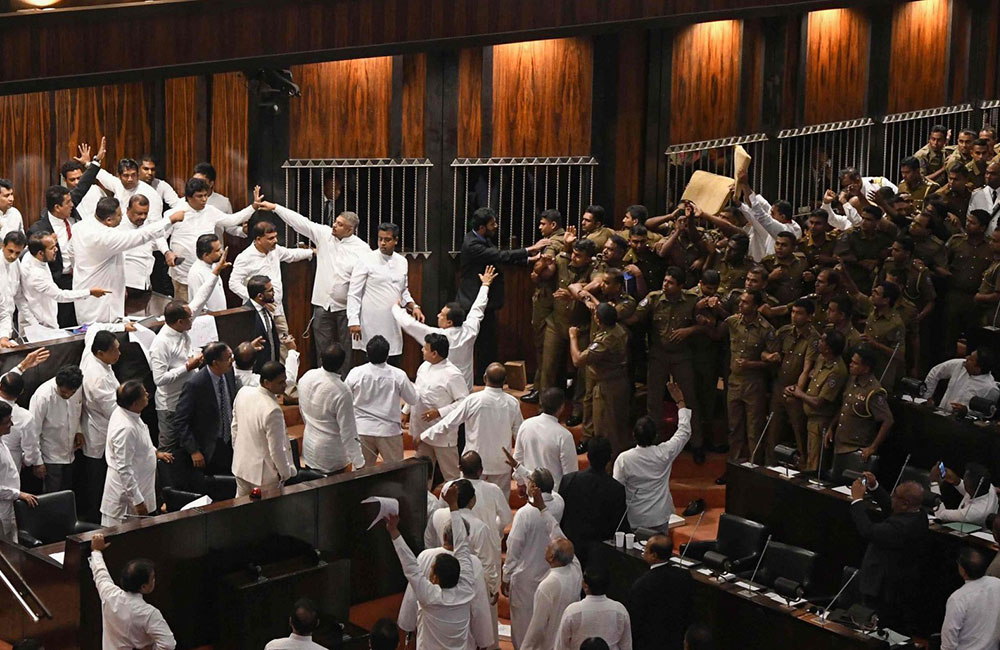
Sri Lanka’s crisis of too many Prime Ministers barrels toward a climax
A political crisis that has gripped this island nation since October is coming to a head this week, when Sri Lanka’s highest court is expected to issue a pivotal ruling in a dispute that has left the country with two people claiming to be prime minister.
The outcome could lead to deeper divisions or push the feuding factions toward a resolution, according to officials and analysts, with implications beyond Sri Lanka. The Indian Ocean nation of 21 million people is positioned along critical shipping lanes and has long been a focus of competition for influence among India, China and the West.
President Maithripala Sirisena ignited the crisis on Oct. 26, when he announced he was sacking his handpicked prime minister, Ranil Wickremesinghe, and replacing him with a former president, Mahinda Rajapaksa, who is popular with the country’s Sinhalese Buddhist majority.
Mr. Wickremesinghe, who has the backing of leaders in parliament, refused to step down and has remained in the official prime minister’s residence even as Messrs. Sirisena and Rajapaksa have brought in a new cabinet and taken over state media outlets. Each side decries the other as illegitimate.
“What’s happened has the shape and structure of a coup even though it hasn’t involved military weapons,” said Nishan de Mel, an economist and political analyst at Verité Research, a think tank in Colombo, the capital. “Sri Lanka has never experienced something like this before.”
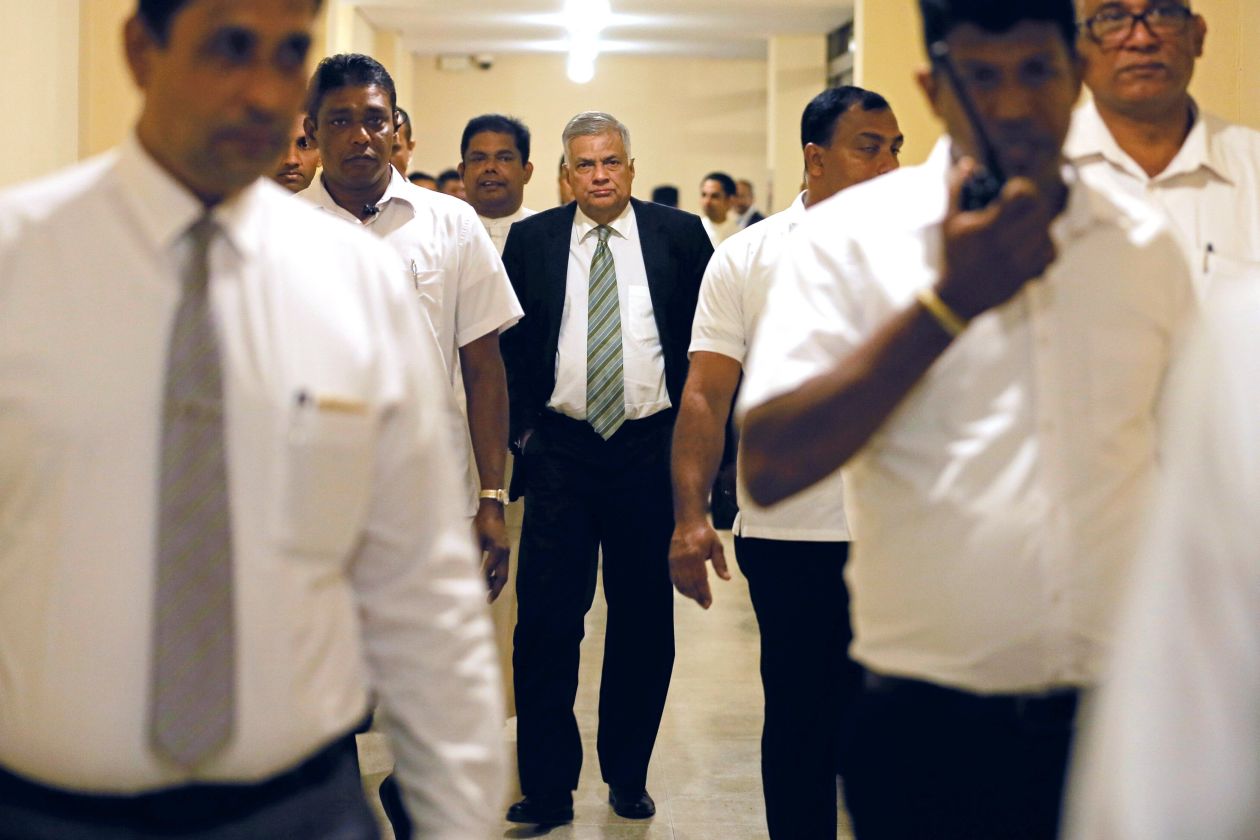
Ranil Wickremesinghe has the backing of leaders in Sri Lanka’s parliament. Photo: dinuka liyanawatte/Reuters
On Monday, an appeals court stayed the appointment of Mr. Rajapaksa and the new cabinet until it issues a ruling next week. Mr. Rajapaksa said he would appeal the stay and Mr. Sirisena said he would review it.
The crisis sparked a melee last month on the floor of parliament. And the economy has taken a hit—the European Union issued a travel advisory and tourist bookings declined, and the government’s credit rating was downgraded.
The currency has also weakened and international institutions have paused some lending and aid programs, including a critical installment of a loan from the International Monetary Fund and talks over a grant of hundreds of millions of dollars from the U.S.
Western governments are watching closely to see how the matter is decided. An orderly, transparent resolution backed by the courts would likely mean increasing engagement with India and the West after a brutal 30-year civil war that ended in 2009 left Sri Lanka internationally isolated.
But ongoing political paralysis, or further turmoil featuring military intervention or street protests, could set the country back on a course toward isolation and once again reliant on China, the one major power that has congratulated Mr. Rajapaksa for his recent appointment. Sri Lanka became heavily dependent on Beijing for loans and political support during Mr. Rajapaksa’s presidency, which lasted from 2005 to 2015.
The confrontation has its roots in the election that ended Mr. Rajapaksa’s presidency.
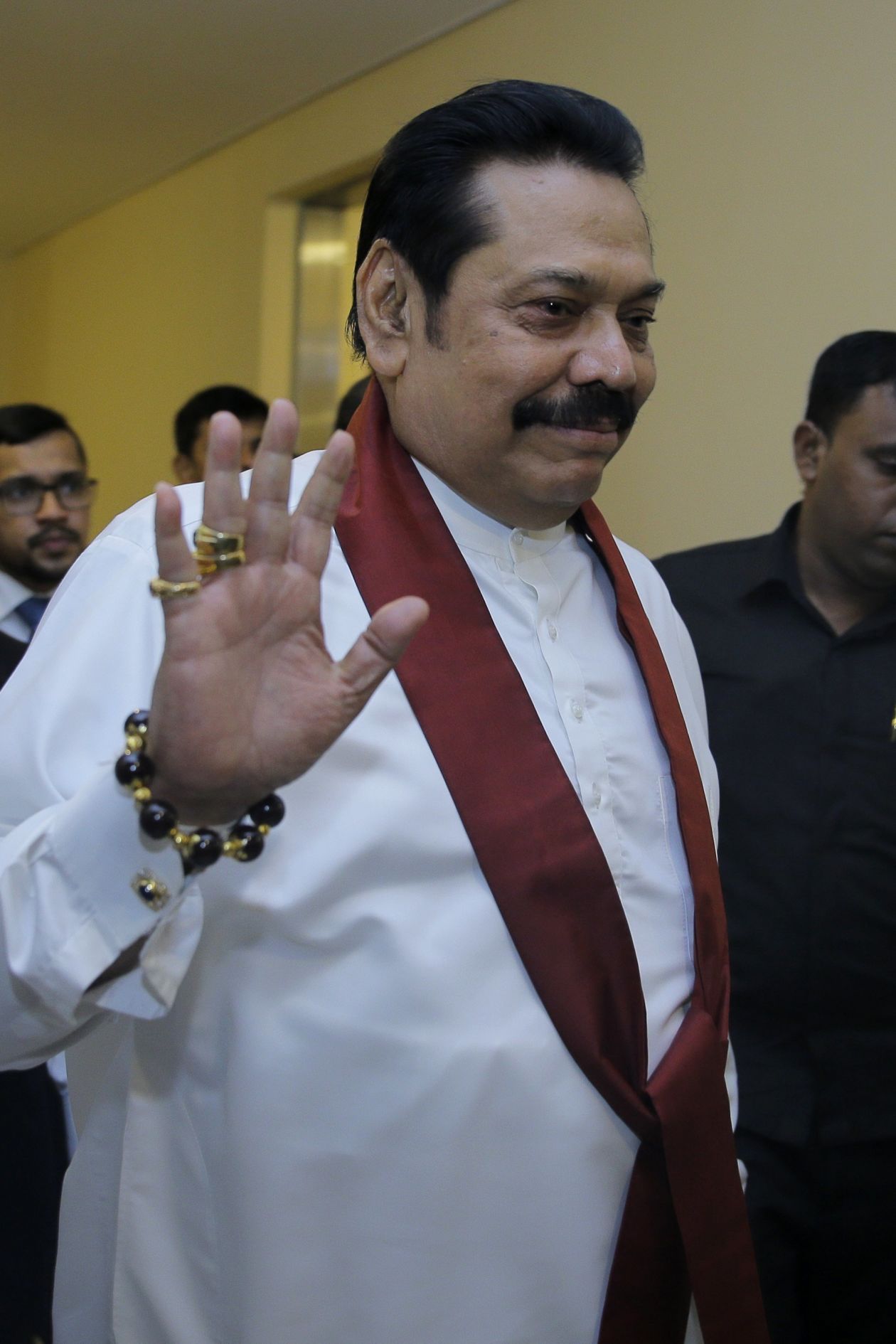
Sri Lanka's former president, Mahinda Rajapaksa, is popular with the country’s Sinhalese Buddhist majority. Photo: Eranga Jayawardena/Associated Press
Mr. Sirisena, who served in Mr. Rajapaksa’s government, ran against him in 2015. Capitalizing on concerns about alleged corruption and the growing power of the president’s family, Mr. Sirisena won a surprise victory and appointed Mr. Wickremesinghe, the head of the main opposition party, as prime minister.
The unlikely pair launched an effort to curb the power of the presidency by shortening the term by a year, and by setting a two-term limit. The changes also required the president’s pick for prime minister to have the support of a majority in parliament, and only allowed the president to dissolve parliament in the final six months of a five-year term.
But Sri Lanka’s economy has slowed in recent years, and tensions between Mr. Sirisena, who comes from a working-class family, and Mr. Wickremesinghe, a lawyer born into Sri Lanka’s elite, have grown.
Mr. Sirisena blames Mr. Wickremesinghe for the economic slowdown and accuses him of being aware of what Mr. Sirisena described as an assassination plot against him.“I had no choice but to go ahead with Rajapaksa,” he said, noting that Mr. Rajapaksa had assured him he could win majority support in parliament.
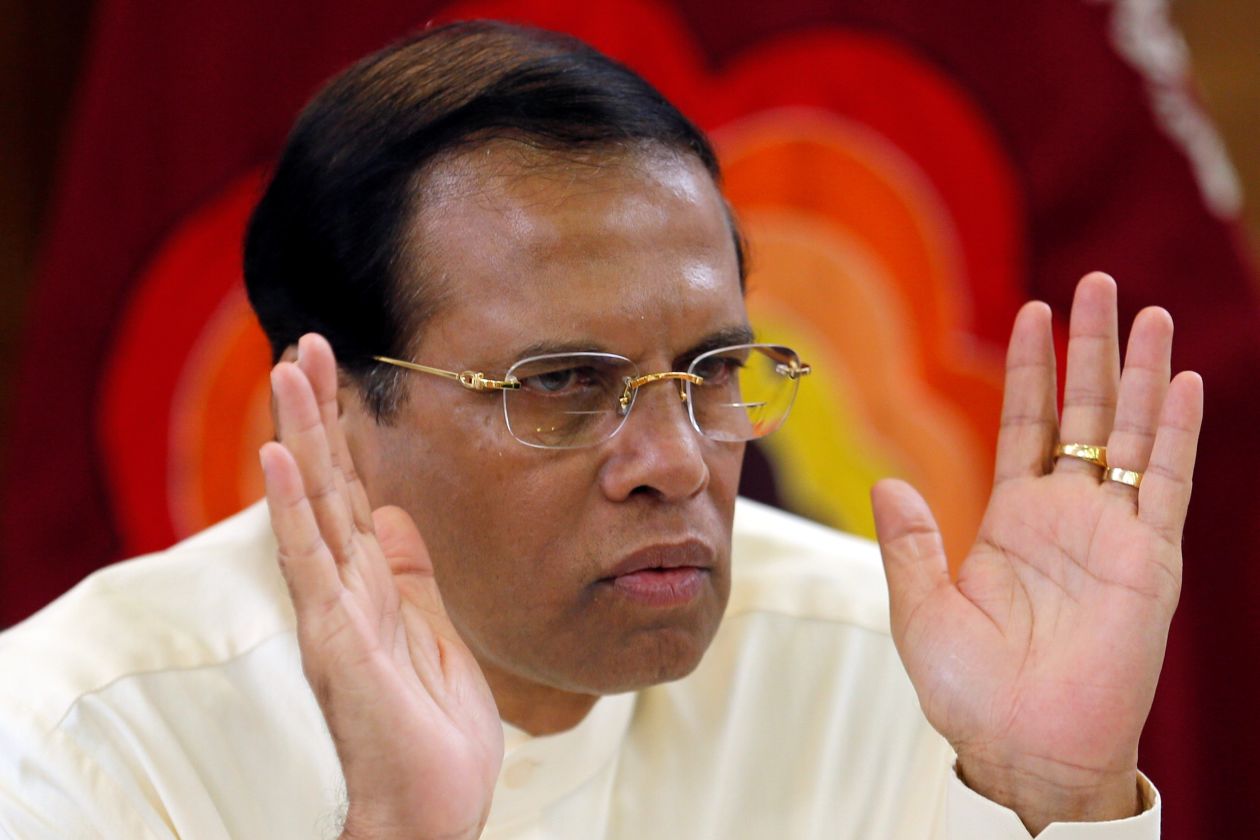
President Maithripala Sirisena blames Mr. Wickremesinghe for the country’s economic slowdown. Photo: dinuka liyanawatte/Reuters
Mr. Wickremesinghe denies he was aware of or involved in any attempt on Mr. Sirisena’s life and blames the country’s sluggish economic performance on hefty payments for debt incurred under Mr. Rajapaksa.
“In 2015, the people gave a mandate to Mr. Sirisena to get rid of Mr. Rajapaksa. He can’t just bring him back and make him prime minister,” said Mr. Wickremesinghe.
Mr. Rajapaksa, though a spokesman, declined to comment. He has defended his appointment as an appropriate and legal move by the president to install a more effective and popular government.
After Mr. Wickremesinghe refused to step aside and Mr. Rajapaksa failed to win parliamentary backing, Mr. Sirisena announced he would dissolve parliament, despite being more than six months from the end of his term, which ends in 2020.
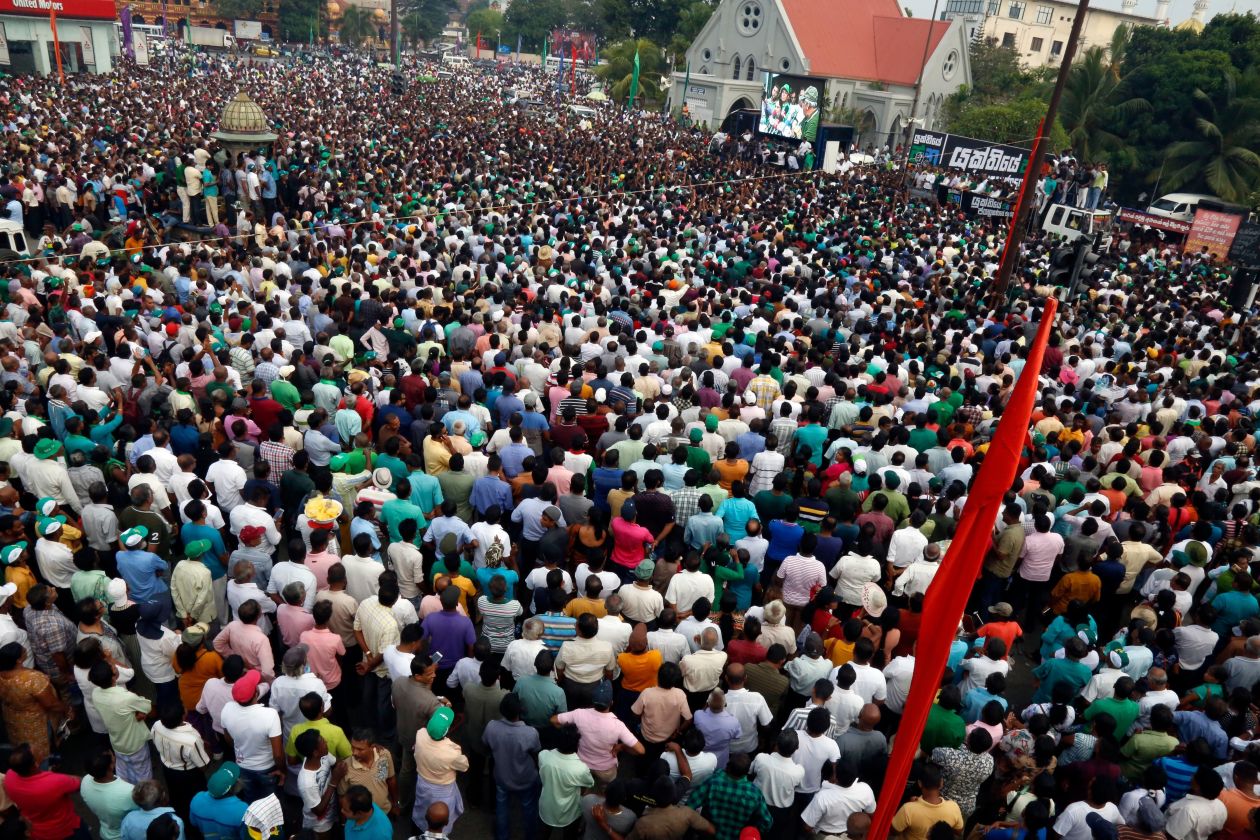
People gathered last month at a protest rally in Colombo organized by Mr. Wickremesinghe’s party. Photo: m a pushpa kumara/epa-efe/rex/Shutterstock
This week, Sri Lanka’s supreme court is expected to decide whether Mr. Sirisena’s move was constitutional.
A deal between the two sides that sidelines Mr. Rajapaksa for now remains possible. Mr. Sirisena said he is willing to appoint another candidate who would have majority support in parliament. But Mr. Wickremesinghe’s backers control the majority and say they will only support him. Both sides are jockeying ahead of a possible parliamentary election, which could happen as soon as early next year.
And Mr. Rajapaksa is continuing to try to build popular support, appearing on posters visible across much of the country. The blunt appeal concerns some observers. “They may not be willing to take no for an answer,” said Alan Keenan, an analyst with the International Crisis Group, which monitors global conflicts.
(The Wall Street Journal)
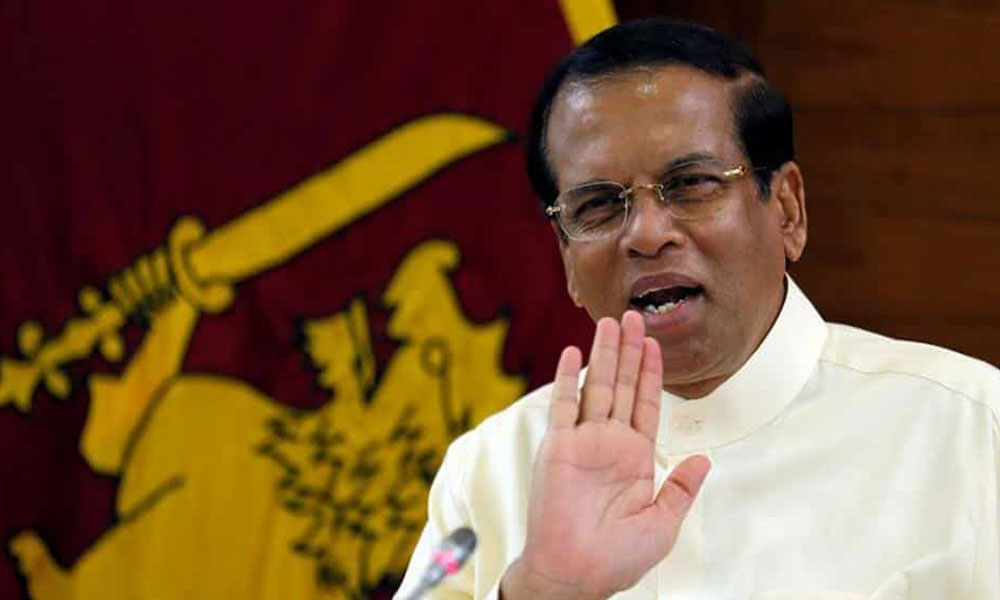
Supreme Court begins hearing petitions against Sirisena’s decision to dissolve parliament
Sri Lanka’s Supreme Court on Tuesday began hearing petitions against President Maithripala Sirisena’s decision to dissolve Parliament and call for a snap election after sacking prime minister Ranil Wickremesinghe that triggered a major constitutional crisis in the country. The country has been in a political crisis since October 26 when Sirisena removed Wickremesinghe and installed ex-strongman Mahinda Rajapaksa in his place.
Sirisena later dissolved Parliament, almost 20 months before its term was to end, and ordered snap election. The Supreme Court overturned Sirisena’s decision to dissolve Parliament and halted the preparations for snap polls.
The apex court on Tuesday morning began the hearing on the fundamental rights petitions filed against Sirisena’s gazette notification to dissolve parliament.
A seven member bench presided by the Chief Justice Nalin Perera began hearing oral submissions, court officials said. The court on November 13 issued an interim order annulling the gazette notification which made Sirisena’s parliamentary sacking temporary illegal.
The submissions would be heard till Thursday. A court on Monday barred Rajapaksa from acting as Prime Minister. The Court of Appeal temporary halted Rajapaksa and his Cabinet from functioning in their positions in response to a case filed by 122 legislators against his disputed government.
Both Wickremesinghe and Rajapaksa claim to be the prime ministers. Wickremesinghe says his dismissal is invalid because he still holds a majority in the 225-member Parliament.
Prior to the crisis, Wickramasinghe’s UNP had the backing of 106 parliamentarians while Rajapaksa and Sirisena combine had 95 seats.
Rajapaksa has, so far, failed to prove his majority in Parliament.
Wickremesinghe, with the support from the main Tamil party, claims to have the support of more than 113 legislators, required for simple majority.
The Tamil National Alliance (TNA) has 16 seats in the house and JVP has six legislators.
The UNF has moved three no trust motions against Rajapaksa, who has refused to step down.
The Sri Lankan president has said that due to sharp personal differences with Wickremesinghe he would not reappoint him as the Prime Minister.
However, Wickremesinghe’s UNP claims that Sirisena will be left with no choice as he would be the man who will command the confidence in the House. Violent scenes were witnessd in Parliament as it went on to approve motions which proved that Rajapaksa lacked majority.
(Reuters)
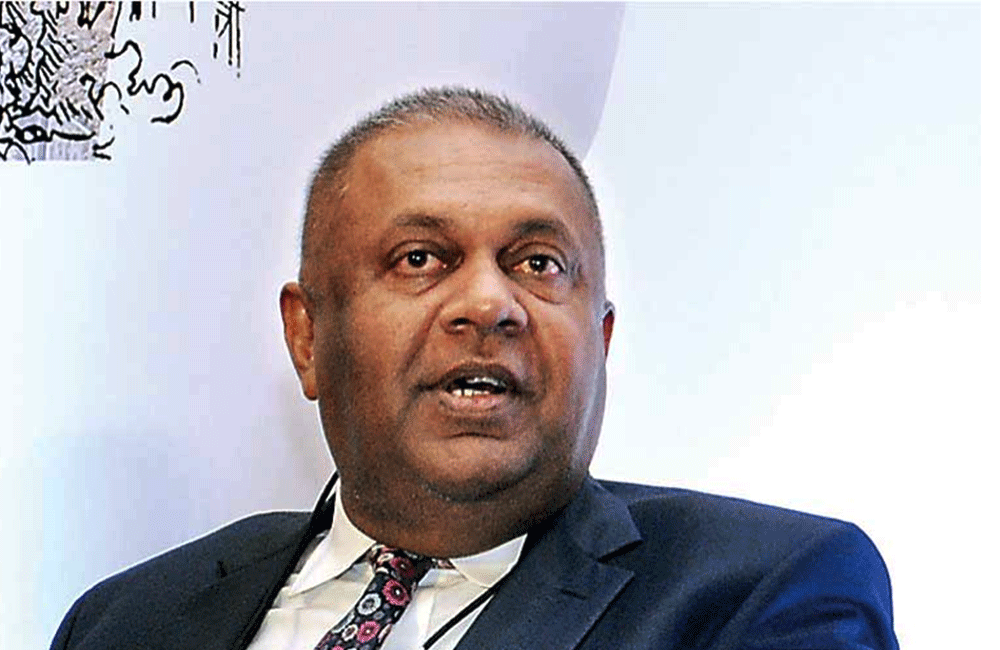
Impeachment is the only way out: Mangala
Former Minister of Finance and Media Mangala Samaraweera said that President Maithripala Sirisena has proven beyond any reasonable doubt that he is not fit to govern after listening to his rant today at the Sri Lanka Freedom Party's sessions today.
Samaraweera tweeted by saying that the only way out of this crisis is to impeach president Sirisena.
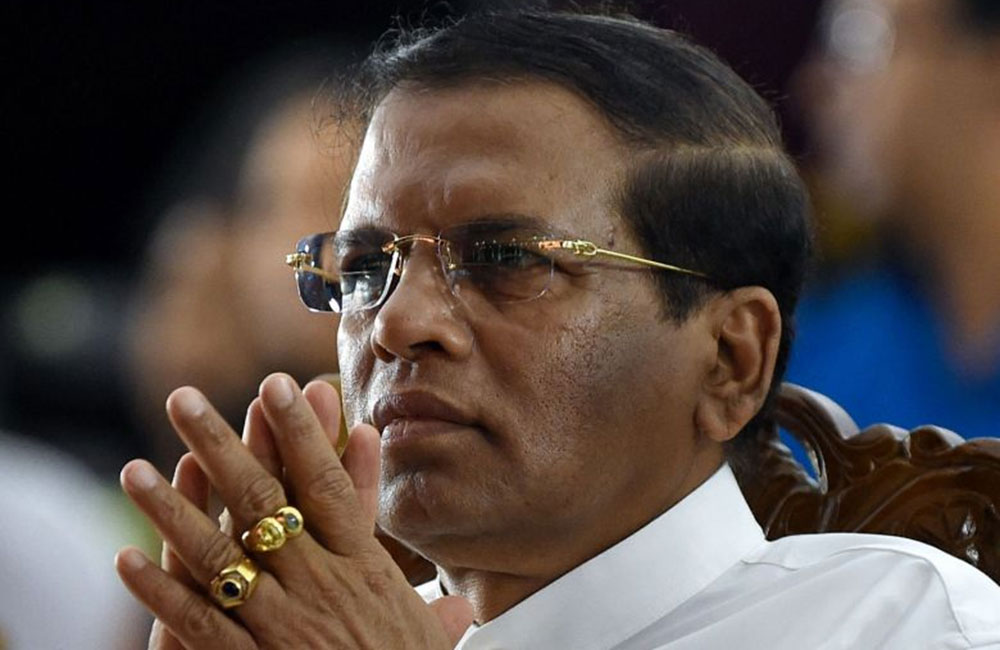
Sirisena plans religious propaganda programme to influence Supreme Court decision!
The FR petition seeking the Supreme Court to declare the Gazette issued by President dissolving parliament as unconstitutional will be taken up today.
Sources say officials of the conspiracy government are attempting to pressurize the decision to be made in the President’s favour by exerting undue influence through religious propaganda.
Accordingly, the religious propaganda is said to be aimed at non-Buddhist judges in the bench including Chief Justice Nalin Perera. As planned by the group, the propaganda will claim the issue is not one of the constitutionality of the Gazette but a battle between the Buddhist temple and the Christian church. They have planned to circulate news that the church, under the influence of the interntional community, has intervened to defeat the President's Gazette. They also hope to suggest that the decision must be given in favour of the President to prove otherwise.
Sources also say there is an attempt to spread a false news that the court will deliver a split decision. The group appears to have fallen to the lowest of low in the knowledge that the decision will most likely be unfavourable to the Executive as pointed out by legal luminaries and the Attorney General himself to President Sirisena as it is clearly stated in the Constitution that the President has no power to sack the PM and dissolve parliament prior to its term of 4 ½ years.

Tourism industry decimated by political crisis
Just four days before the unconstitutional coup on October 26, the small island of Sri Lanka was selected as the number one country in the world for travellers to visit in the coming year by world leading travel authority, Lonely Planet, in its “Best in Travel 2019”.
With more than 2.5 million foreign holidaymakers visiting Sri Lanka every year, tourism plays a key part in the country’s economy, responsible for bringing in an estimated USD 3.5 billion in revenue.
Officials had expected that to rise by around 10 percent in the coming year but hotels and tour operators have begun to report a spate of cancellations affecting the whole tourism industry in the country, official sources said.
The crisis has prompted western governments to call for parliamentary democracy to be restored immediately while forcing countries to issue travel advisories amidst negative news about legislators loyal to Rajapaksa rioting Parliament.
While no official figures have been given, deluxe hotels have reported cancellations and a critical decline in new bookings since the crisis.
“This comes at the worst possible time when people in Europe are making their holiday plans abroad,” a Colombo city hotel executive said.“We have had a lot of cancellations from the United States. With the political crisis, our winter season is gone,” the director of a luxury beach resort in the south of the island said.
“You should exercise vigilance and avoid all demonstrations or large political gatherings,” a British government advisory said.
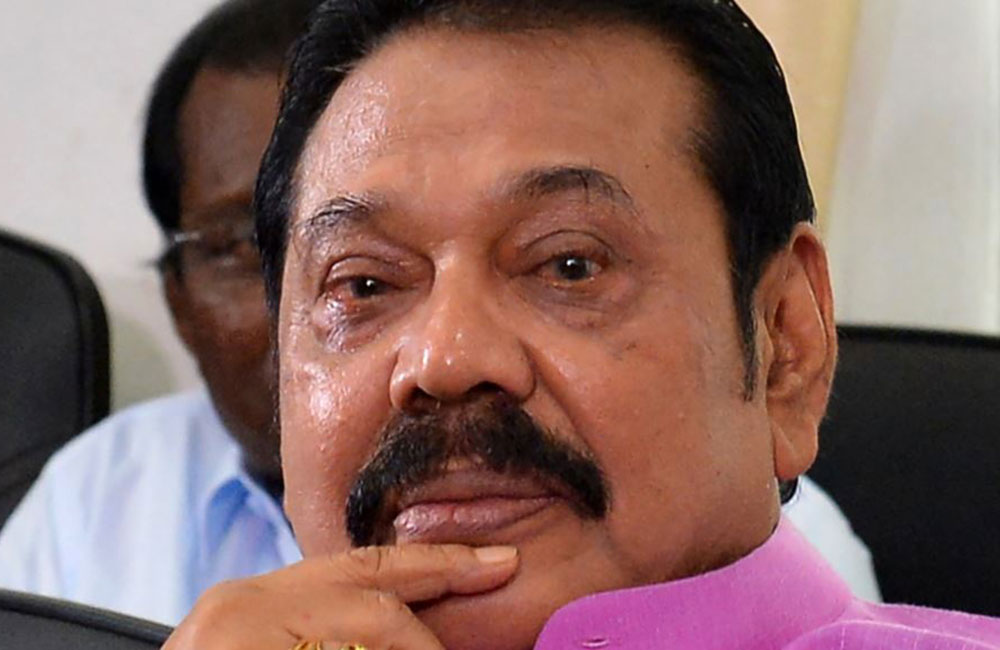
Mahinda Rajapaksa rejects Appeal Court verdict
Former Prime Minister Mahinda Rajapaksa said that he does not agree with the interim order that was issued by the Court of Appeal today.
“We are not in agreement with the interim stay order issued by the Appeal Court suspending the functioning of the Cabinet of Ministers.
We will be presenting an appeal to the Supreme Court tomorrow morning against this stay order. We wish to emphasize the fact that the interpretation of the constitution and in making final determinations in that regard, is exclusively vested in the Supreme Court by the Constitution," the former prime minister said in statement typed on a personal letterhead.
The Court of Appeal issued an interim injection until December 12th barring Rajapaksa and his Cabinet from continuing in their positions in response to a writ of Quo Warranto filed by 122 legislators against the disputed government.
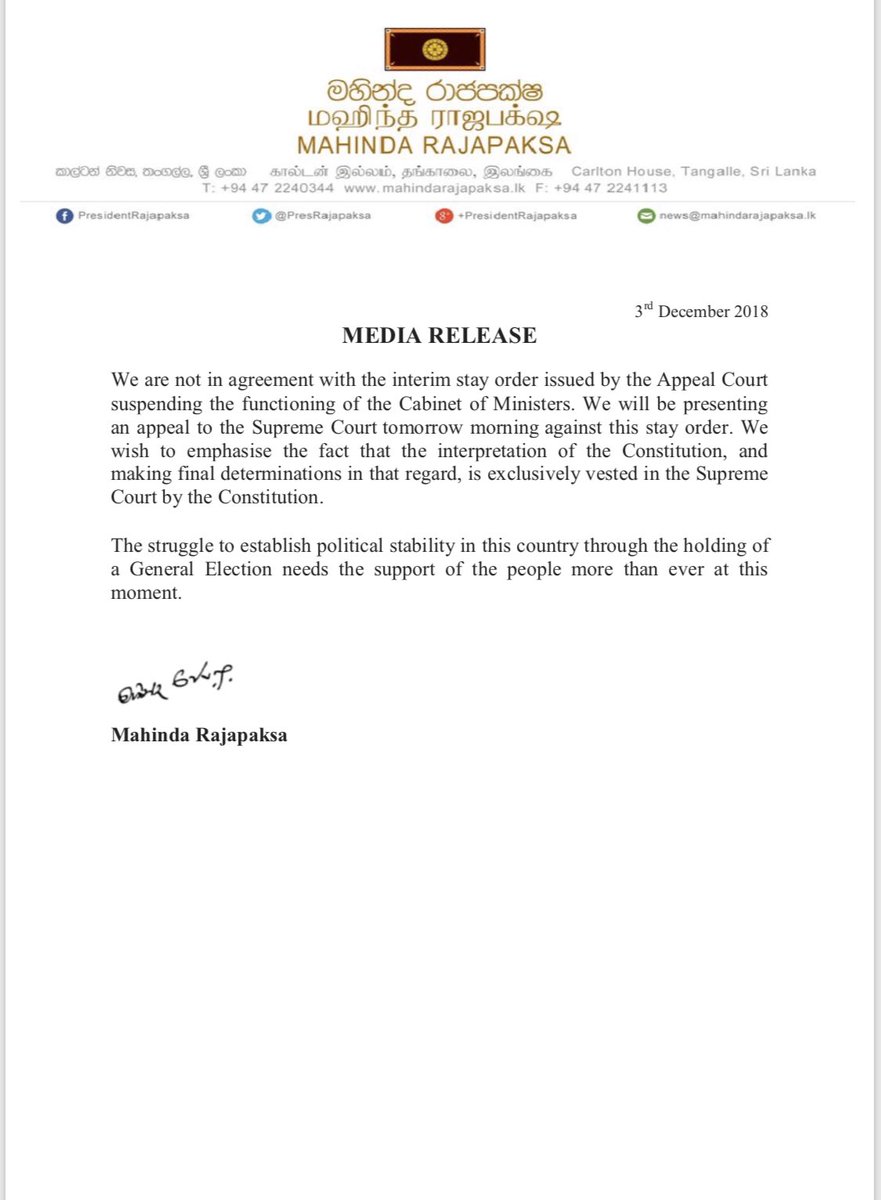
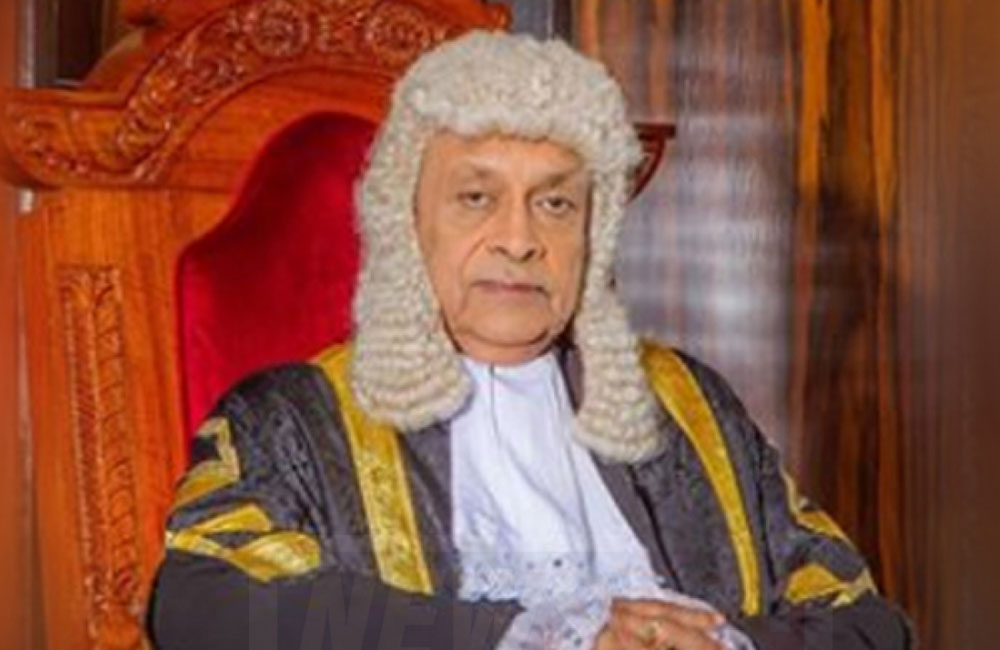
Speaker calls for the end of sale of MPs
Sri Lanka has been facing a severe socio-political and economic set back as a result of the ongoing political crisis which has disrupted the normal proceedings of parliament, Speaker Karu Jayasuriya emphasized issuing a media release today (4).
President Maithripala Sirisena has so far failed to accept the majority of 122 MPs of four major political parties allowing the minority and solitary United National Front to continue its functions as the ruling party.
Sri Lanka's Court of Appeal on Monday issued an interim order restraining Prime Minister Mahinda Rajapaksa and the Cabinet of the purported government from functioning until the petition is heard on 12th December.
The ruling by the Court of Appeal comes after former Prime Minister Mahinda Rajapaksa refused to step down despite losing two no-confidence motions in parliament last month.
Speaker Karu Jayasuriya said that immediate measures should be taken into on going attempts to buy over MPs by the Rajapaksa political clan using parliamentary powers and reiterated that he is fully committed towards this endeavour.
He expressed the belief that all party leaders should focus their attention on settling the current political crisis without seeking petty political gains, he added.
He noted that the president and the whole state machinery should focus their attention towards restoring normalcy once again in the country without pushing it into an abyss.
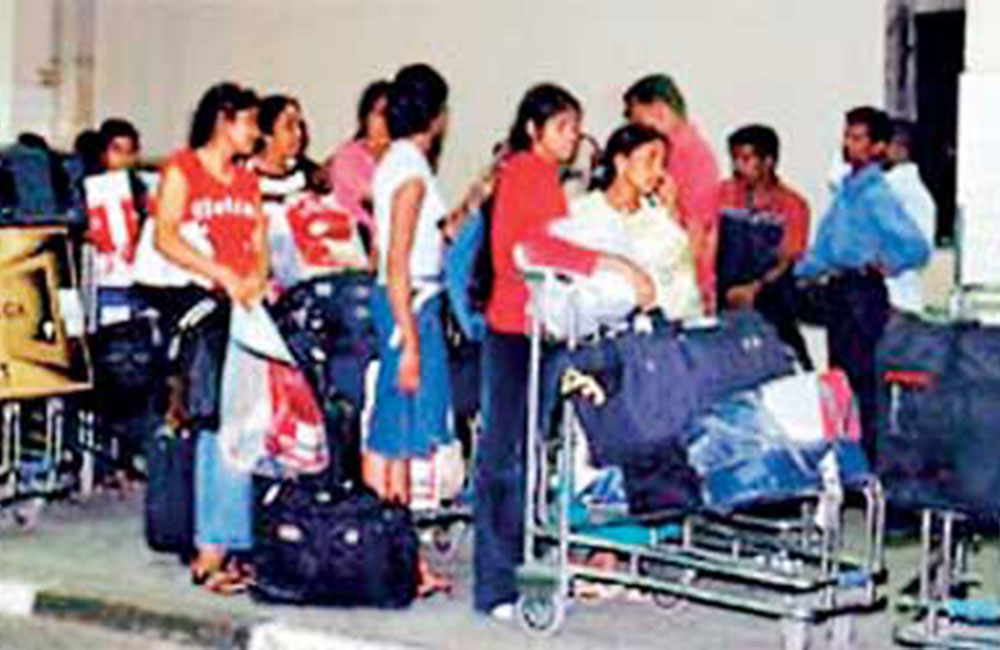
Sri Lanka workers' remittances decline amidst crisis
The workers' remittances to Sri Lanka have declined during September, though the earnings from tourism have continued to grow marginally, providing a cushion to the current account of the external account, the Central Bank announced recently.
Workers’ remittances declined by 7.1 percent, year-on year, to USD 500 million in September 2018. Consequently, workers’ remittances declined by 1.5 percent to USD 5,277 million during the first nine months of 2018 in comparison to the corresponding period of 2017.
Tourist arrivals recorded a marginal growth of 2.8 percent in September 2018 as a result of a decline in the number of tourists arriving mainlyfrom India, Maldives and France in comparison to September 2017.
Tourist arrivals during the first nine months of 2018 totalled 1,731,922 which was a 11.6 percent increase over the corresponding period of 2017.
Earnings from tourism in September 2018 are estimated at USD 276 million, with cumulative earnings amounting to USD 3,212 million during the first nine months of 2018.
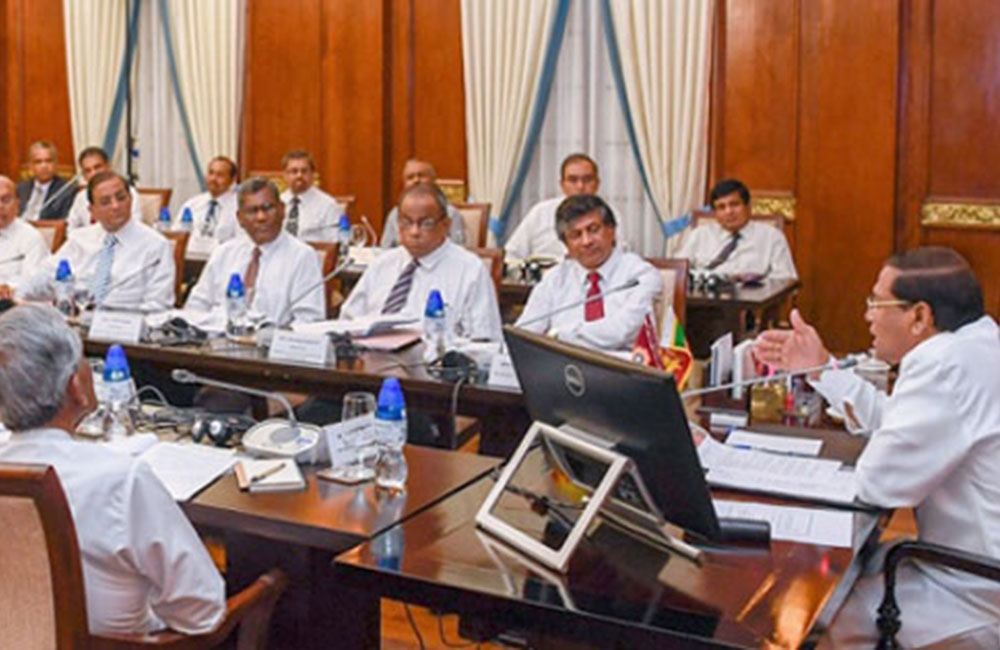
Ministry Secretaries that follow President's orders after CA order could face contempt of court charges
President Maithripala Sirisena has given instructions to all ministry secretaries to fulfill their duties and responsibilities according to the laws of the country without any disruption, the Presidential Media Division (PMD) said today (04).
However, as per the Constitution's Article 48 (2), with the Court of Appeal order confirming the November 14 no-confidence motion that defeated Mahinda Rajapaksa, his purported Cabinet stands dissolved. As such, ministry secretaries could be held in contempt of court, legal experts said.
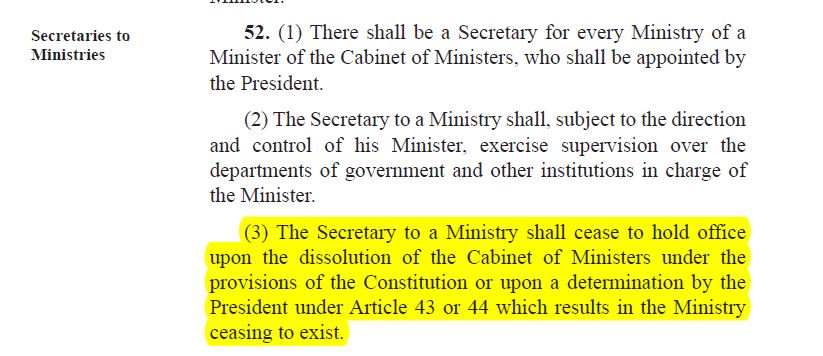
Dissolution of Cabinet
Accordingly, as per article 52 (3) of the Constitution, If they (Ministry Secretaries) attempt to exercise powers of the office they held, they are in contempt of court and can be charged under the penal code 114 and 115, and Offences against Public Property Act.  Secretaries to the Ministrie
Secretaries to the Ministrie
Legal experts also said that the president could instruct Ministries that are under his direct purview but not all.
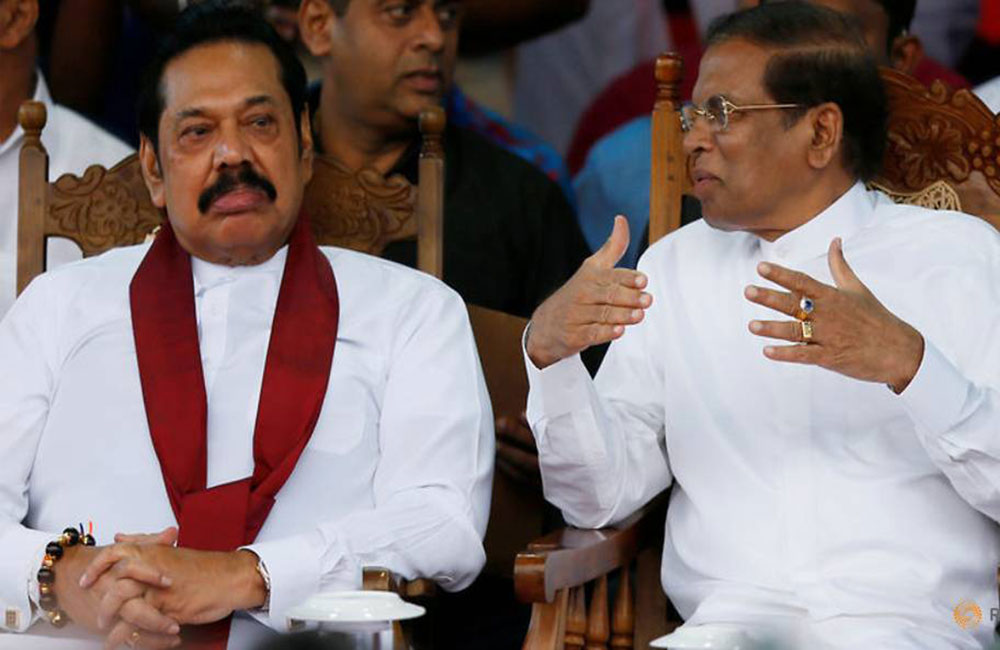
All cabinet decisions of Sirisena-Rajapaksa cabinet suspended
The implementation of all cabinet decisions taken during the past month by the new cabinet of ministers appointed by president Maithripala Sirisena have been suspended following the court order today (3).
The Court of Appeal issued an interim injunction order restraining 'purported' Prime Minister Mahinda Rajapaksa and his Cabinet from functioning until the hearing of the Writ of Quo Warranto filed against them holding office is concluded.
The recent populist tax revisions and ad hoc concessions offered to the public on the directions of former Finance Minister Mahinda Rajapaksa has led to a loosening of fiscal policy, a decline in economic growth and resulted in the suspension of foreign investment, economic experts said.
15 tax revisions which will come into effect from January 1 next year on the directions of the Ministry of Finance have also been restrained.
An attempt to raise billions of rupees for government coffers by way of directing public corporations and state owned companies to invest surplus funds in eight state-owned banks with the aim of bringing such funds under the finance ministry purview has also been thwarted.
The implementation of all Cabinet decisions taken since the unconstitutional coup will also have to be suspended, Justice Ministry sources said.
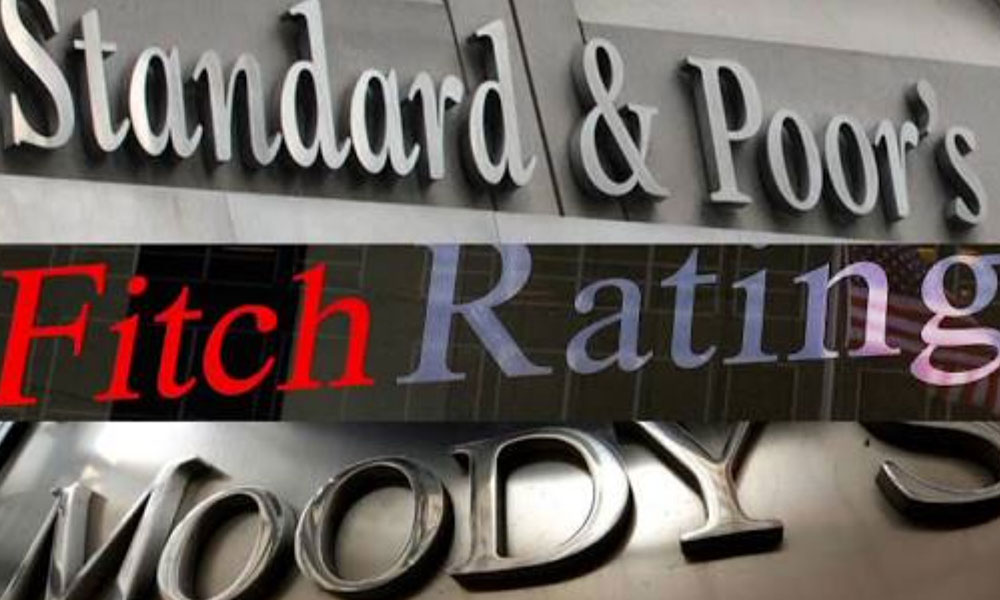
Standard & Poor's follow Fitch and Moody's in cutting Sri Lanka's credit ratings;
Standard & Poor's Global Ratings said on Tuesday that it lowered Sri Lanka’s sovereign credit rating to ‘B’ from ‘B+’.
S&P’s action follows a downgrade of Sri Lanka by Fitch Ratings earlier today (04), citing refinancing risks and an uncertain policy outlook.
Moody's too downgraded Sri Lanka ratings late last month. As such, all three major rating agencies have downgraded Sri Lanka since the unconstitutional coup on October 26.
Credit rating agencies, in essence, rate a country on the strength of its economy. More specifically, they rate governments on how likely they are to pay back their debt.
A rating affects how much it costs governments to borrow money in the international financial markets. In theory, a high credit rating means a lower interest rate (and vice versa).
Ratings can be a warning system for potential investors, and make it more expensive for poorly-rated nations like Sri Lanka to borrow money.
The former government of ousted prime minister Ranil Wickremesinghe said that they expected to borrow LKR 1,944 billion from local and foreign sources for its debt servicing, including the financing of the budget deficit in 2019, before it was toppled in a coup.
The recent ad hoc, populist tax concessions introduced by former Finance Minister Mahinda Rajapaksa have raised serious concerns among financial analysts as more tax cuts mean more borrowing to fund expenses such as public sector wages, pensions and samurdhi payments.
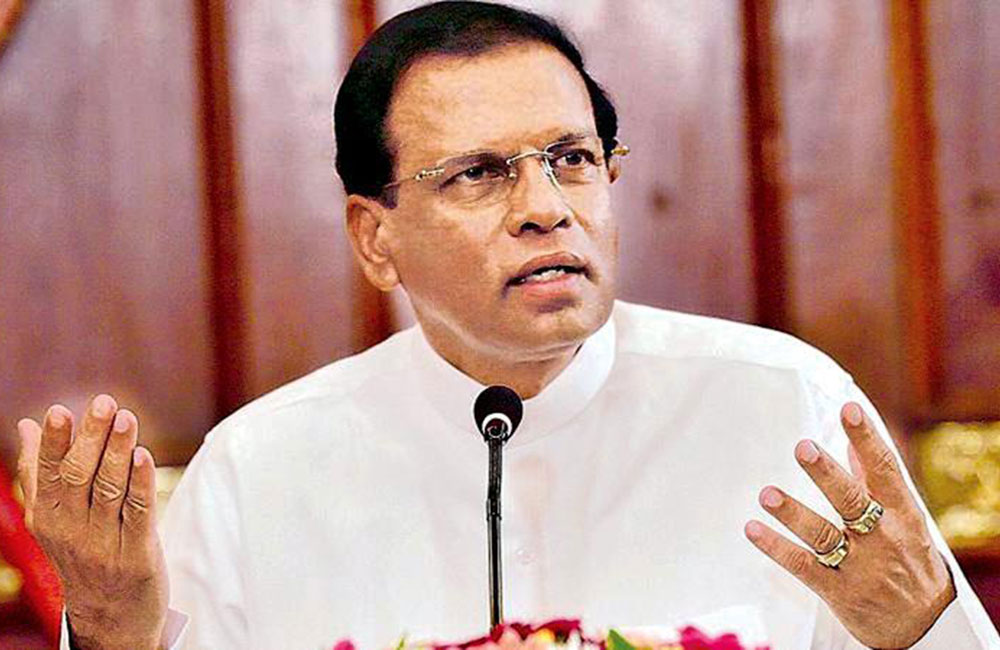
All cabinet decisions of Sri Lanka president’s new ministers thwarted
The implementation of all cabinet decisions taken by new cabinet of ministers appointed by the president during the past one month period of political impasse have been stalled following court order today( Monday 3)
Court of Appeal issued an interim injunction order restraining Prime Minister Mahinda Rajapaksa and his Cabinet from functioning until the hearing of the Writ of Quo Warranto filed against them holding office is concluded.
Under the present circumstances, recent tax revisions and ad hoc concessions offered to the public on the directions of new finance minister appointed by the president which has led to a loosening of fiscal policy declining the economic growth and investment have been suspended economic experts said.
15 tax revisions which will come into effect from January 1 next year on the directions of the finance ministry have also been restrained.
An attempt to raise billions of rupees for government coffers by way of directing public corporations and state owned companies to invest surplus funds only in eight state owned banks with the aim of bringing such funds under the finance ministry purview has also been thwarted.
The implementation of all cabinet decisions taken during the past one month period will have to be suspended, Justice Ministry sources said.
Page 355 of 510
